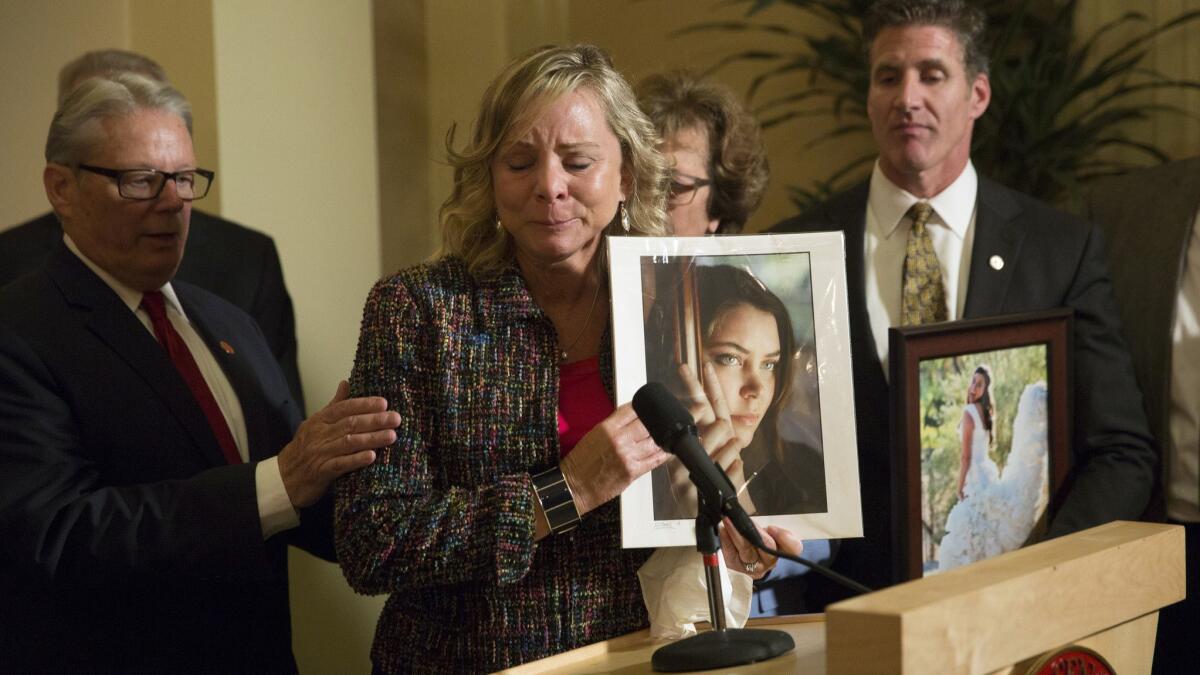Editorial: Don’t let a technicality leave California’s sick and dying in the lurch

The suspension of California’s nearly 2-year-old right-to-die-law late last week came as a shock. After all, it had taken a quarter-century to get the law passed in the first place, and by all accounts, it was working well. It’s a moderate, reasonable measure with many safeguards built in, and it has apparently been used sparingly and as a last resort by terminally ill people seeking an alternative to pain and suffering during their last six months of life.
Worse yet, the law — which allows patients with a prognosis of six months or less to live the right to obtain lethal drug prescriptions from their physicians — was struck down not on the merits, but on a technicality: that it was passed in a special session of the Legislature called specifically to address the issue of Medi-Cal funding.
It initially seemed that the law would be allowed to remain in place while the legal appeal process continued. But on Friday, Riverside County Superior Court Judge Daniel A. Ottolia officially invalidated the law, cruelly leaving untold numbers of very sick people in legal limbo.
Not hypothetical people, either, but real ones, including 48-year-old Matthew Fairchild of Burbank, who has terminal melanoma that has spread to his bones and brain and faces an agonizing death. He isn’t yet within six months of dying, but when that time comes, he had been counting on being able to obtain a prescription if his pain became intolerable. Fairchild was one of three Californians who asked Ottolia on Wednesday to reverse his ruling. The request was denied.
It’s heartless to deny dying people a small measure of comfort in their final days. It’s especially heartless to do so on a technicality — and to do so before the appellate courts have had time to consider the issue.
California needs this compassionate and sensible law, which has provisions to protect against anyone being coerced into prematurely ending their lives.
In our view, the basis for the suspension of the law is on shaky grounds. The bill originally died in a committee hearing during regular session of the Legislature in 2015 and under normal circumstance that would have been the end of it. But the bill was revived months later in a special session called by Gov. Jerry Brown to address Medi-Cal revenue. It wasn’t the cleanest process, but the governor’s proclamation calling for the special session left the door open to the consideration of other healthcare related bills. That’s what legislative leaders believed when they sent the aid-in-dying bill to the floor. A majority of members of the Legislature voted in favor of it — and Gov. Brown signed it. Ottolia’s conclusion that it was inappropriate for the special session is an unnecessarily cramped and narrow reading of Brown’s proclamation.
California needs this compassionate and sensible law, which has provisions to protect against anyone being coerced into prematurely ending their lives. In fact, during a legislative hearing in January, healthcare providers and family members of dying patients testified that it may be too difficult to access the law, not too easy.
The state attorney general’s office is defending the law in court, as it should. And there is another hearing, set for June 29, during which Ottolia could reverse himself. If that doesn’t happen, a stay might be granted later this summer. Or it might not.
But here’s another relatively easy solution: Legislators could bypass the courts and approve a new right-to-die law that would render the technical questions about its original passage moot. Even before the state’s medical aid-in-dying law took effect, an overwhelming majority of Californians said they supported allowing terminally ill people to voluntarily end their own lives. And now that all the fears voiced during the debate over the law have been proved unfounded, it seems unlikely the Legislature would be so cruel as to vote no.
Follow the Opinion section on Twitter @latimesopinion and Facebook
More to Read
A cure for the common opinion
Get thought-provoking perspectives with our weekly newsletter.
You may occasionally receive promotional content from the Los Angeles Times.










